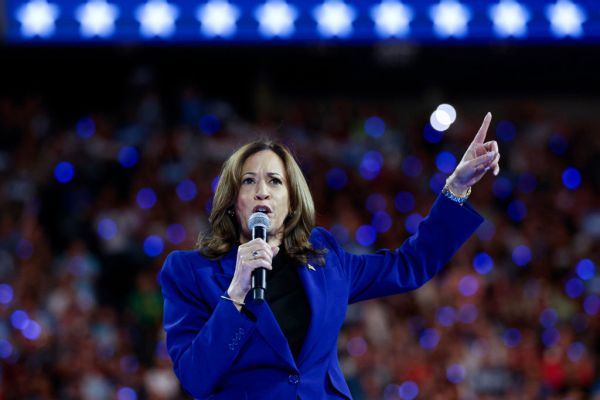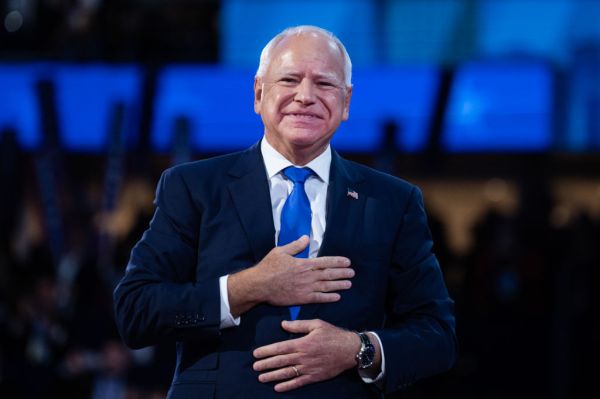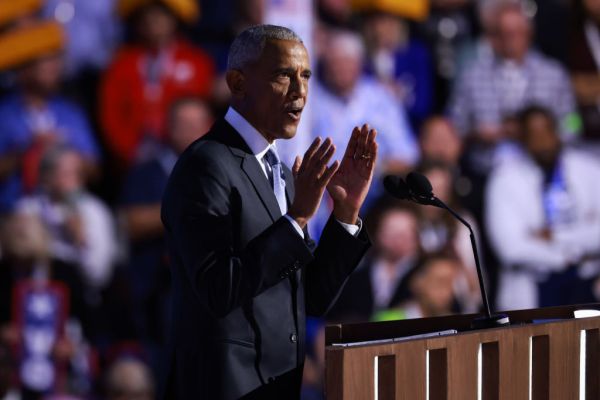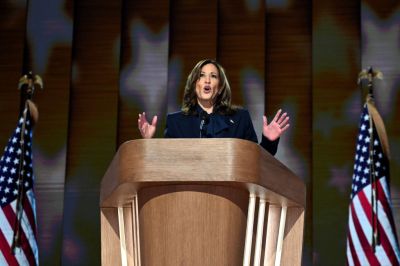Happy Friday! Thanks for sticking with us this week as we fulfilled our mission from God here in our new sweet home-away-from-home, Chicago. (No police cruisers were harmed in the production of this newsletter, that we know of.)
Up to Speed (Convention Edition)
- The convention’s poor logistics for the press cropped up once again on the event’s final night. The media galleries at the United Center filled to capacity hours before Vice President Kamala Harris began to speak. Additionally, media members were unable to access the floor of the convention at all Thursday night due to capacity restrictions from the city fire marshal.
- Delegates representing voters who chose “uncommitted” in Democratic presidential primaries earlier this year ended their sit-in just outside the United Center Thursday night after unsuccessfully seeking a speaking slot for a Palestinian American. With arms linked, they walked into the United Center, but they were turned away from the floor at first because of the aforementioned capacity restrictions. After that, they linked arms again and walked around the arena concourse chanting, “Ceasefire now!” Then, they entered separately and were allowed to take their seats. “They're going to go to their respective delegations and sit there, be visible on the floor, participate in the party, following our process,” Dan Thomas-Commins, an uncommitted delegate from Minnesota, told Dispatch Politics. “We're not here to disrupt, we're not here to cause chaos. We're here to use the tools and the votes that have been given to us, the voices and the presence that has been given to us.”
- On Thursday evening, just outside the security perimeter of the United Center, Dispatch Politics spotted Cornel West, the gadfly academic and 2024 presidential candidate. Several members of the security staff and even some convention guests waiting in line to enter the perimeter said hello to West and snapped selfies with him. When Dispatch Politics asked West if he was going to drop out of the race and endorse Harris, West said he would not. Pressed about the plans of another independent presidential candidate, Robert F. Kennedy Jr., to withdraw on Friday, West shook his head. “That brother, he’s going through some conniptions,” he said.
- Rep. Bennie Thompson, who chaired the House’s committee on the January 6 Capitol riot, defended his bill to strip Secret Service protection from ex-presidents who are sentenced to at least a year in prison for the commission of a crime. Though he filed the bill in April, Thompson faced backlash following the assassination attempt on former President Donald Trump in July. “If you are a felon and get convicted, why should the Secret Service protect you in prison? The Department of Corrections is challenged to do that. And so, it wasn’t specifically directed at Donald Trump, but if the shoe fits, you have to wear it,” he said Thursday during a discussion at the CNN-Politico Grill. The text of the bill stipulates that Secret Service protection would cease upon a former president being sentenced for a crime, so Trump would have had Secret Service agents with him during the July rally in Butler, Pennsylvania, where a gunman wounded him and killed a bystander.
Up to Speed (Beyond Chicago)
- Former President Donald Trump seemed to back off his years-long feud with Georgia Gov. Brian Kemp in a Thursday Truth Social post. “Thank you to #BrianKempGA for all of your help and support in Georgia, where a win is so important to the success of our Party and, most importantly, our Country,” he wrote. “I look forward to working with you, your team, and all of my friends in Georgia to help MAKE AMERICA GREAT AGAIN!” Trump has had bad blood with Kemp since he lost Georgia in 2020, and he attacked Kemp as recently as earlier this month, saying he would not be governor without the former president’s endorsement. When asked by Dispatch Politics if this signified a detente with Trump, a source close to Kemp responded simply: “For now.”
Harris Makes Her Case To Be Commander in Chief

CHICAGO—Kamala Harris accepted the Democratic nomination for president Thursday night in an arena filled to the brim with members of her party, reenergized and confident about the final months of the race. Her acceptance speech reflected the new sense Democrats have about their fortunes in the 2024 campaign: They could actually win.
Harris’ tight, 40-minute address—delivered to a crowd supplied with U.S. flags and “Kamala” signs—drew heavily on American idealism and exceptionalism. “Fellow Americans, I love our country with all my heart,” Harris said at one point. She spoke of the “promise of America” and “the incredible journey that is America.”
That patriotic theme capped off a Democratic National Convention that leaned into positive descriptions of the nation—sounding, at times, more like a Republican gathering. Each night, delegates on the floor of the United Center arena waved signs that said “USA” and could often be heard chanting the same three letters. Either buoyed by their newfound optimism in their electoral chances or reacting to Donald Trump’s reflexively grim diagnosis of the state of America, Democrats seemed in a mood to celebrate their love of country.
“Our opponents in this race are out there, every day, denigrating America, talking about how terrible everything is,” Harris said. “Well, my mother had another lesson she used to teach. Never let anyone tell you who you are. You show them who you are.”
The vice president ticked through parts of her own biography, introducing herself as the daughter of a strong and supportive immigrant mother. Shyamala Harris raised Kamala and her sister after her parents divorced while she was in grade school. The future vice president grew up “immersed in the ideals of the civil rights movement” and was encouraged by her father to “run” and “don’t let anything stop” her. She became a lawyer, a prosecutor, and eventually attorney general of the state of California.
Harris cast herself as a fighter for “the people” of America who are pursuing the same opportunities her mother did when she immigrated to the United States from India at age 19, setting up one of the most effective lines of her speech:
“On behalf of my mother and everyone who has ever set out on their own unlikely journey,” Harris said. “On behalf of Americans like the people I grew up with—people who work hard, chase their dreams, and look out for one another—on behalf of everyone whose story could only be written in the greatest nation on Earth, I accept your nomination for president of the United States of America.”
She also connected the current political fight with those of America’s past.
“It is now our turn to do what generations before us have done,” Harris said, “guided by optimism and faith, to fight for this country we love, to fight for the ideals we cherish, and to uphold the awesome responsibility that comes with the greatest privilege on Earth: the privilege and pride of being an American.”
Going right at Trump.
When it came to discussing her opponent, Harris dropped the mockery and crudeness that some of the convention’s other speakers engaged in. Instead, she made a more straightforward case that Trump is unfit for office.
“In many ways, Donald Trump is an unserious man,” she said. “But the consequences of putting Donald Trump back in the White House are extremely serious.”
The vice president focused on Trump’s refusal to acknowledge his loss in the 2020 election and his efforts to overturn that outcome. “Donald Trump tried to throw away your votes,” she said. “When he failed, he sent an armed mob to the United States Capitol, where they assaulted law enforcement officers. When politicians in his own party begged him to call off the mob and send help, he did the opposite. He fanned the flames.”
She also touched on Trump’s felony conviction on 34 counts of falsifying business records and a separate civil decision finding him liable for sexual abuse, linking this wrongdoing with what the former president could do if elected again.
“Just imagine Donald Trump with no guardrails, how he would use the immense powers of the presidency of the United States not to improve your life, not to strengthen our national security, but to serve the only client he has ever had: himself,” she said.
And Harris continued to focus on a topic that Democrats have been hitting throughout the week: the Heritage Foundation’s Project 2025, specifically the lengthy list of policy proposals that form the project’s Mandate for Leadership. While liberals have promoted several false claims about what Project 2025 says, the plan has served as a rallying cry about what they view as the perils of a second Trump administration. It’s also led Trump to distance himself from the project.
That did not stop Harris on Thursday from saying a second Trump term is “all laid out” in the project’s manifesto.
Speaking to the center.
Harris also outlined, in vague terms, her domestic policy prescriptions. She boasted she was “charting a new way forward” that seemed to be directed right toward the middle of the political spectrum.
She promised to create an “opportunity economy” and help the middle class by lowering costs of essentials while preserving entitlements. She claimed Trump wanted to institute a “national sales tax,” referencing his call for a 10 percent tariff on all imports—though the Biden administration has kept in place many tariffs from the Trump administration.
“Instead of a Trump tax hike, we will pass a middle-class tax cut that will benefit more than 100 million Americans,” Harris said.
She hewed more tightly to the Democratic Party line on abortion, promising to codify a right to abortion in federal law. “And one must ask: Why exactly is it that they don't trust women? Well, we trust women,” she said. “And when Congress passes a bill to restore reproductive freedom, as president of the United States, I will proudly sign it into law.” In addition, she claimed that Trump and his allies would pass a national ban on abortion “with or without Congress.”
But she continued to try to address her biggest domestic policy weakness, immigration, by turning the issue around on her opponent. The vice president drew a line between Trump and herself on immigration, hitting the GOP nominee for his reported efforts to kill a bipartisan immigration deal in the Senate so that he could campaign on the issue. Harris promised to sign that same bill into law as president.
“I know we can live up to our proud heritage as a nation of immigrants and reform our broken immigration system,” she said. “We can create an earned pathway to citizenship and secure our border. America, we must also be steadfast in advancing our security and our values abroad.”
The commander-in-chief pitch.
Perhaps no element of Harris’ political positions had been less clear than her stance on national security and how she would manage myriad global challenges as commander in chief. Until Thursday, there had been little discussion of these crucial issues in Chicago, either by the Democratic VIPs who addressed convention delegates or her running mate, Minnesota Gov. Tim Walz.
But Thursday evening, the Harris campaign leaned into foreign policy and national security topics, although not necessarily by laying out specific strategies. In the convention speeches leading up to her own, Harris was presented as a focused, sophisticated, and no-nonsense commander in chief who would ensure American military dominance and diplomatic influence. The Democratic nominee, combat veterans and former national security officials argued, will stand up to rogue nations like Iran and American adversaries like China, and maintain key alliances in Europe and the Asia Pacific.
“Our warriors need a tough, cool-headed commander in chief to defend our democracy from tyrants and terrorists,” said Leon Panetta, a former Democratic congressman who served as defense secretary and Central Intelligence Agency director under President Barack Obama. “We need Kamala Harris behind the Resolute Desk.”
Harris, whose nearly five-week old campaign has been light on details about what she would do as president, did add some foreign policy meat to the bone during her speech. Like most other portions of her address, the vice president’s remarks on the topic were broad and thematic, not hyper-specific, aimed at showing voters that she would be a strong leader who protects U.S. national security and does not back down from confrontation with authoritarians and dictators.
“Know this: I will never hesitate to take whatever action is necessary to defend our forces and our interests against Iran and Iran-backed terrorists,” Harris said at one point. (Harris also vowed to continue supporting Ukraine in the war instigated by Russia’s unprovoked invasion.)
However, on one issue with major political implications for the November 5 election, Harris was more unequivocal than she has been to date, first as the presumptive, and now the official, Democratic nominee for president. And, that issue was what U.S. government policy would be in a Harris administration as it relates to Israel, and, tangentially, the Palestinians.
“With respect to the war in Gaza, President Biden and I are working around the clock, because now is the time to get a hostage deal, and a ceasefire deal done,” the vice president said. “And let me be clear, I will always stand up for Israel’s right to defend itself and I will always ensure Israel has the ability to defend itself. Because the people of Israel must never again face the horror that a terrorist organization called Hamas caused on October 7, including unspeakable sexual violence and the massacre of young people at a music festival.”
“At the same time,” Harris added, “what has happened in Gaza over the past 10 months is devastating. So many innocent lives lost. Desperate, hungry people fleeing for safety over and over again. The scale of suffering is heartbreaking. President Biden and I are working to end this war such that Israel is secure, the hostages are released, the suffering in Gaza ends and the Palestinian people can realize their right to dignity, security, freedom and self determination.”
Notable and Quotable
“IS SHE TALKING ABOUT ME?”
—Former President Donald Trump, posting on Truth Social during Vice President Kamala Harris’ Democratic National Convention speech, August 22, 2024.








Please note that we at The Dispatch hold ourselves, our work, and our commenters to a higher standard than other places on the internet. We welcome comments that foster genuine debate or discussion—including comments critical of us or our work—but responses that include ad hominem attacks on fellow Dispatch members or are intended to stoke fear and anger may be moderated.
With your membership, you only have the ability to comment on The Morning Dispatch articles. Consider upgrading to join the conversation everywhere.